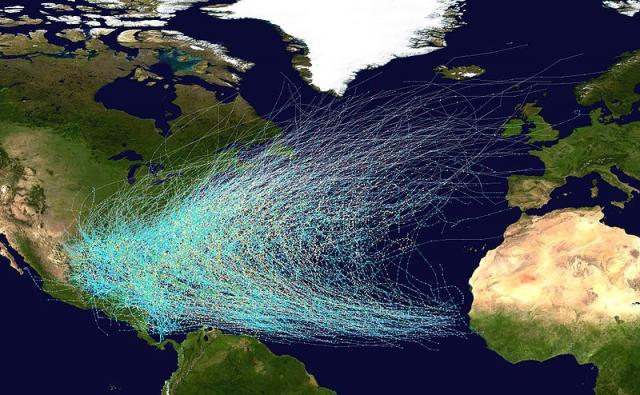Uh oh. Hurricane season has started early.
On Saturday (the 19th), when Tropical Storm Alberto spun up off the Carolina coast, forecaster Brennan of the National Hurricane Center had this to say:
ALBERTO IS EARLIEST–FORMING TROPICAL STORM IN THE ATLANTIC BASIN SINCE ANA IN 2003. THIS IS ALSO THE FIRST TIME THAT A TROPICAL STORM HAS FORMED BEFORE THE OFFICIAL START OF THE HURRICANE SEASON IN BOTH THE ATLANTIC AND EAST PACIFIC BASINS.
2003 was a busy season
The truth is that heat isn’t the only thing that influences hurricanes, and this year, the pre-season hurricane forecasts are sort of all over the place. Some are predicting an above-average season, some a below average season; it all seems to centrally depend on whether or not El Nino kicks in. This global weather pattern tends to suppress hurricanes in the Atlantic, though it can be rocket fuel for them in the Pacific. The current El Nino forecast, from NOAA’s Climate Prediction Center, says we’re in what are called “ENSO neutral” conditions and those are expected to persist through summer. After that, it’s fifty-fifty whether we’ve got El Nino or a continuance of neutral conditions. So far, NOAA has not yet released its much anticipated May 2012 Atlantic hurricane forecast, which hopefully will make more sense of this and other variables. I’d expect that any day now. But of course, even in a quiet season, it only takes one storm to cause a ton of damage. And even a relatively weak storm can have this effect, depending upon its location. Last year’s Hurricane Irene turned out to be the sixth most damaging U.S. hurricane in recorded history, even though it was only a Category 1 when it made its first landfall (and was weaker thereafter). But nevertheless, it charged up a heavily populated coastline and, inland, dropped a ton of rain. Last year, I went on a rant about Irene, and more particularly about how the U.S. media were claiming the storm was overblown (pun intended) because, like, it didn’t end up putting New York City underwater. I pointed out that nobody can forecast a storm’s strength perfectly, but New York is highly vulnerable, as is all of the U.S. east coast, to hurricane disaster. Indeed, as the picture of cumulative Atlantic hurricane tracks above shows unmistakably, it’s only a matter of time. Irene was also widely linked in the media to global warming—as if global warming is supposed to increase our risk of Category 1 hurricane landfalls—which just goes to show how fundamentally irrational the U.S. climate debate is. We completely ignore climate change on a day-to-day basis; then we seize on single events like individual hurricanes or tornadoes as a reason to frantically discuss it. How precisely backward. To me, it’s all further evidence of the disconnect between the statistically impaired and heuristic happy human mind on the one hand, and the steadily changing climate system on the other. And since we aren’t all going to evolve into Vulcans anytime soon, this is something we’ve got to learn to deal with. My appropriately cynical outlook at this point, then, is this. Right or wrong, weather events are what make people focus on global warming. Nothing else has the same impact. So they have to be used to communicate about climate change; and in fact, they will be used by the media to communicate climate change, for better or worse. The problem—both substantively and strategically–is that such events are inherently unpredictable; e.g., we don’t know if we’re going to face any landfalling U.S. hurricanes this year. Nonetheless, they naturally raise climate issues in the mind of the public and therefore require that the topic be addressed—albeit using scientifically accurate and appropriate messages. After all, it’s not just that weather powerfully influences people’s view of what is up with climate. It’s that talking about the local impacts of climate change is what really makes people care about the issue. And there really are going to be many such impacts, including from hurricanes (which, if nothing else, will be riding atop a higher ocean in the future). In fact, they’ve already begun. Fox News has made a specialty of using individual snowstorms as a statistically abusive way to undermine the idea of global warming. So how should climate advocates use weather? The answer is simple: As an opportunity to make the statistically accurate point that global warming isn’t distant, and isn’t in the future: It affects Americans. It affects them today. And it affects them where they live.
Subscribe to our newsletter
Stay up to date with DeSmog news and alerts







